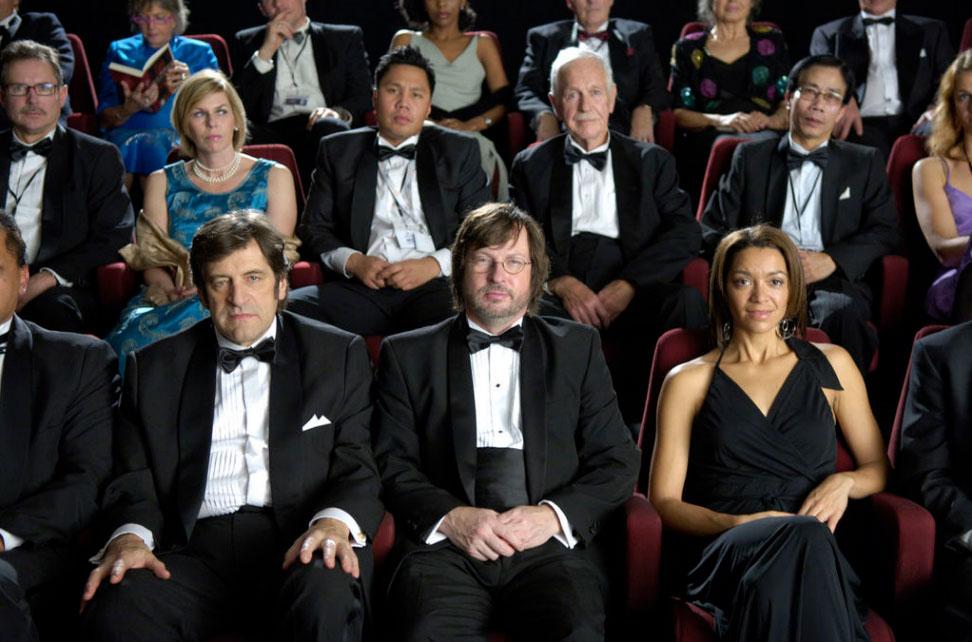ABOUT KOSMORAMA

HISTORY OF KOSMORAMA
The first issue of Kosmorama was published on 1 October 1954. The name, Kosmorama, was chosen for three reasons: the word means "view of the world," Kosmorama was the name of first cinema in Denmark and 1954 was the 50th anniversary of the opening of the Kosmorama cinema. The editorial of the first issue of Kosmorama declared that the target readership was above all "film enthusiasts" – those who go the cinema to be enlightened and learn something about the world, unlike "film fans" who just want to "relax." The writers saw it as their goal to write about film as art, and quality was not relative. The journal was published by the Danish Film Museum as a quarterly.
Over the years, the journal changed its format and layout a few times. Changing editorial staffs kept the film-as-art banner flying and disseminated practically everything worth knowing about film in myriad essays, interviews, long features, film capsules and reviews, premiere schedules, reports from Cannes and the other major festivals, "Seen on TV," and capsules and reviews of books on film. In the first many years, the limited column space was also used for thorough filmographies ("Film Index") of selected filmmakers – all the information that is now found in the Danish Film Database on the DFI website.
In summer 1997, Kosmorama’s form radically changed, at the same that the Film Museum became part of the Danish Film Institute at the new Filmhouse in Gothersgade. A close editorial partnership was established with the Department of Film and Media Studies at the University of Copenhagen, giving Kosmorama a more research-based character. The publication now looked like a book and was published biannually, featuring longer articles clustered around a specific theme. Starting with Issue #242 / Winter 2008, the editors worked with peer-reviewed articles. The last print issue was #248 / Winter 2011.
KOSMORAMA OF THE FUTURE – ACCESS TO THE BACK CATALOGUE
On 30 May 2013, Denmark’s oldest film journal left paper and library shelves behind and moved to the Internet.
The digital form presents numerous new opportunities. Since 1954, hundreds of expert writers have contributed shelf loads of articles. All of it will now be digitised. In the future, Kosmorama will also be a portal to a comprehensive back catalogue of issues that has so far been available only at libraries in its entirety. Articles will be searchable and tagged with metadata. Accordingly, digital Kosmorama in years to come will grow into a veritable database of film writing spanning six decades, ripe for exploring by subject, person, film title, etc.
ONLINE ARTICLES – NEW OPPORTUNITIES
Kosmorama will continue to publish new articles on film and film culture. Not, as in the former print edition, as biannual theme issues. Reading web articles with links to related articles and subjects does not invite the serial form of reading that a theme issue in book form is made for. Online, readers create their own contexts and reading patterns. New articles will be in two formats: peer-reviewed research articles and non-peer-reviewed articles of a more popular nature. Peer-reviewed articles will be clearly labelled "PEER REVIEWED" at the top of the page. Another opportunity that the digital form presents is embedding film clips in articles. In the future, this form of communication will be tested out in some, but not all, new articles.
LANGUAGE AND SEARCHING
Until now, Kosmorama was published in Danish. The Internet is global and so is the interest in Danish film culture. Across the world, Danish cinema and culture are studied at centres of Scandinavian studies at many universities. Researchers and teachers at these centres generally speak and write Danish, Norwegian, Swedish, or a charming mix of them all, and they constitute an important segment of digital Kosmorama’s target readership. We want to reach out to the international interest in Danish cinema and culture, and we likewise want to accommodate Scandinavian cinema and culture. Thus, in the future, selected Kosmorama articles will be available in Swedish, Norwegian and English.
All articles, both the born-digital and those in the back catalogue, will be tagged, making it possible to search across them. Subject words are taken from bibliotek.dk’s indexing as well as from the FIAF periodicals database, and so are in both Danish and English. Free-text searching is, of course, also an option.
RESEARCH FORUM
For years, as mentioned, Kosmorama has been published in a formalised partnership between the Department of Film and Media Studies at the University of Copenhagen and the DFI. A significant contribution to Danish cinema culture is now going online. The DFI is in charge of digital Kosmorama, while the cooperation between scholars at Copenhagen University and other universities in Denmark and abroad will naturally continue as before. In the future, Kosmorama will continue to spread awareness of activities taking place in research environments, including research-related activities conducted and offered by the DFI. The Kosmorama website will feature a research forum, where film scholars can share information about lectures, seminars, workshops, new publications and similar initiatives and research-based activities.
EDITORS AND EDITORIAL BOARD
Kosmorama is an independent non-profit film journal, published by The Danish Film Institute / Archive and Cinemateque, Gothersgade 55, 1123 København K.
Editors:
Lars-Martin Sørensen (Editor in Chief, DFI)
Jannie Dahl Astrup (DFI)
Claire Thomson (UCL)
Web:
Henrik Fuglsang (DFI)
Editorial board:
Julie Allen, University of Madison-Wisconsin
Stephan Michael Schröder, Köln University
Gunnar Iversen, Norwegian University of Science and Technology, Trondheim
Mats Jönsson, Göteborg University
John Sundholm, Karlstad University
Gunhild Agger, Aalborg University
Morten Egholm (DIS)
Casper Tybjerg, Copenhagen University
Helle Kannik Haastrup, Copenhagen University